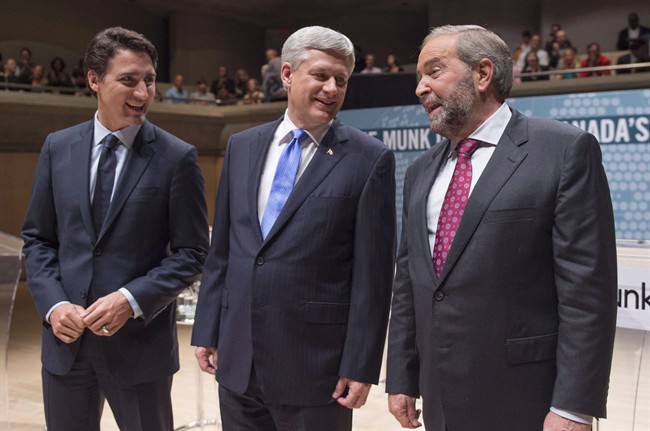
Stephen Harper, Tom Mulcair and Justin Trudeau have spent the past 11 weeks styling themselves as Canada’s next prime minister. Only one of them will be.
The other two may find themselves not only missing out on their prime ministerial dream job but with their existing party leadership gigs in jeopardy.
“Any one of the leaders tonight could lose their jobs,” said Ian Capstick, managing partner at Mediastyle.
“Any one of the political leaders not achieving what the expectations of their members are … could most certainly find themselves in some hot water with their caucus.”
Of the three, said Carleton University politics professor Gary Levy, Liberal leader Justin Trudeau’s job may be the safest.
“Justin Trudeau’s done well, better than expected,” he said. “So I expect he’s around for another election. …
“He’s going to be a very popular guy for a while.”
Capstick isn’t so sure.
“If there’s any form of a majority government and the Liberals are not part of it, most certainly we would see the knives out for Justin Trudeau,” he said.
“The Liberal party of Canada has never let their leader lose an election and move into the second one. Or very rarely, I should say.”
Conservative leader Harper, who turned a Conservative-Reform-Alliance Frankenstein into a formidable political force and held power longer than anyone thought he would, may not last much longer as party leader.
“I think it’s unclear, unless he gets a majority, whether he’ll be around,” Levy said. “If it’s a minority, he’s going to lose within a few months.”
Capstick said Harper will likely face a caucus and Tory rank-and-file “either gently or more aggressively attempting to show him the door.”
And it may be in the Conservatives’ political interest, if they win a minority, to hold a leadership convention, get a new leader and ask Governor General David Johnston to call a new election.
“Same Conservative platform, just without Harper, they think would give them a majority.”
NDP leader Tom Mulcair is in an interesting position: He could lead his party to its second-greatest federal victory in history and still disappoint people who expected more.
Capstick, whose husband works for Mulcair’s campaign, thinks the party will give him a second chance.
“The New Democratic party doesn’t have a history of cannibalizing its leaders,” he said.
“I think there would be a huge call for Mr. Mulcair to stay on if he brings back the second-best result the New Democrats have ever had.”
And Capstick thinks Mulcair proved himself at least to existing NDP party faithful, if not the Canadian public at large, over the course of this campaign.
But Levy suspects Mulcair may resign Monday evening — or see himself turfed later.
“I have a feeling if he does not come in at least second — as in, continue as opposition leader, he’s going to be in a difficult position. … Because he was leading in the campaign and then fell to third, I think people would be quite upset with him,” Levy said.
“He may just go on his own rather than waiting for the party to express their unhappiness with him. …
“If he’s in third, he’ll want to resign.”
Canada’s federal political system is personality-driven, Levy said. So party leaders tend to wear election results.
“Unfortunately, our elections are largely conducted by the leaders. They take the credit and they take the blame,” he said.
“I’d like to see that change.”
Levy would prefer campaigns focused more on policies, and with attention diffused among various senior party members.
“If there’s a foreign policy debate, why not have the minister of foreign affairs or the opposition critic?”





Comments